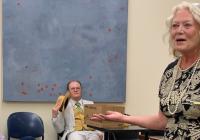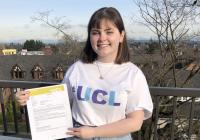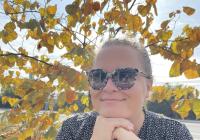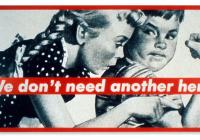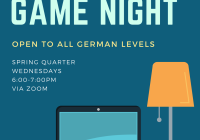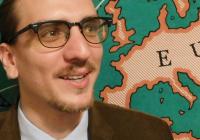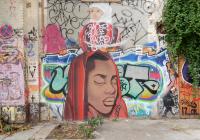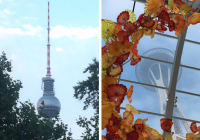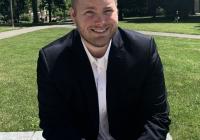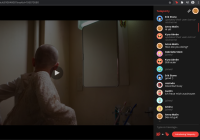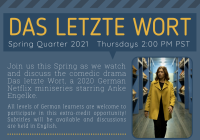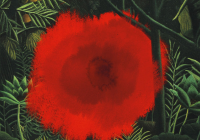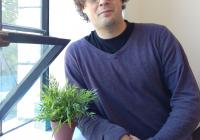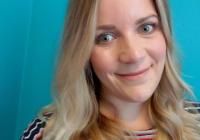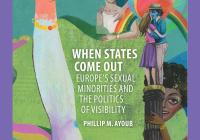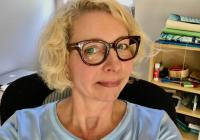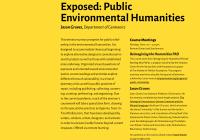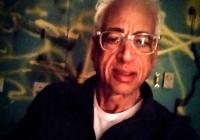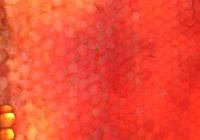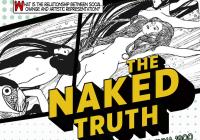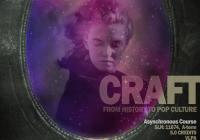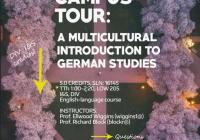Rarely is someone humble and gracious to the point of being self-effacing larger than life, but Joe Voyles was certainly that. He never boasted of his expertise or talked much about his research, but as our former dean Mike Shapiro told me, “Few of his colleagues realize what a towering figure he is in the field.” Mike went on to say how he always found time for a talk or presentation given by Joe Voyles. None of us were surprised by his brilliance; there was certainly evidence of that in…
Convocation Program
Thursday, June 10, 2021
3:00 p.m.
Online Meeting Link
Welcome Professor Sabine Wilke Department Chair
Graduation Address Elena Simms Deputy Consul of Germany, SF Consulate General
Graduation of Class of 2021 Professor Jason Groves
Graduation of MAs and PhDs Professor Ellwood Wiggins
Reflections on Graduate Studies at UW Vanessa Hester… Pattie Unakul, a graduating senior with a major in German, writes:
"The last five years have flown by so quickly! I still remember being a shy freshman, walking into my first German class at Denny Hall. Can’t believe I am graduating in a few weeks!
My most unforgettable memory with the UW Germanics Department is inarguably the Spring in Vienna study abroad program. Not only did I have the opportunity to visit several of the most maginificent cities in the world but I also had a…
The Department of German Studies recognizes that our students are simply amazing. Today, we spotlight Madison Keiran.
your name: Madison Rose Keiran
Class of 2021
your hometown: Ipswich, Massachusetts
your favorite German-language text/author: My favorite German text is Momo by Michael Ende why did you chose German as your language requirement? I have always been interested in the German culture and plan to work for the EU or a European NGO in the future, so German was a perfect fit.…
your name: Sara Koeck Class of 2019 your hometown: Vienna, Austria your favorite German-language text/author: Kerstin Gier when did you know that you wanted to major in German Studies? I think what drew me to German was my desire to get more formal education in a language I grew up speaking. Since I had been in the US for so long, my German speaking was limited to my family. Once I took a class in the department, mostly just for fun, I ended up staying in majoring in German because I…
Enter this portal to a
GALLERY OF SUPERHEROES
poised to save the world from bigotry, hatred, and environmental catastrophe!
Creative teams in "Heroines & Heroes" (German 285/ C LIT 251) worked together to produce three exciting installments in their heroes' adventures: an Exploit; an Origin Story; and a "Going Dark" episode. While… Like many things this past year, the German Club at the University of Washington has gone virtual. Rather than meeting each week at a local coffee shop, the club has instead been meeting weekly via Zoom. Aside from this, not much has changed about the club. The focus was, and still is, to create a greater sense of community amongst German students, and, of course, to practice German.
Each week, the students in attendance select and play an online word game. Some of the most popular choices…
After spending a year teaching English language and culture courses at the Westfällische-Wilhelms Universität Münster, Jeffrey returned to the University of Washington to continue his PhD. In the past year, he has taught courses at the WWU and UW, finished his prospectus, co-organized an interdisciplinary conference, advised the department’s German Club, and is currently participating in an ongoing graduate student workshop on Romanticism studies.
Jeffrey was able to continue remotely…
Invited by our own Kye Terrasi as part of the multi-departmental Colloquium on Transcultural Approaches to Europe, Professor Fatima El-Tayeb shared her vital scholarship on Black Europe in a wide-ranging conversation with Nicolaas Barr that drew on her decades of research. The conversation covered what Professor El-Tayeb terms Europe’s “racial… COVID has prevented many of us from traveling this past year. As an alternative, the Department of German Studies is offering a summer course focused on a virtual exploration of Berlin. German 399: Zoom on Over to Germany- Ich bin ein (Virtual) Berliner will focus on the art, music, food, history, and people of Berlin. A guest speaker from the former DDR will provide their perspective on life in East Germany, and a classical pianist will give us insight into both the…
This year I was the recipient of the Antoinette Wills Endowed Fund for Graduate Students, a scholarship that has provided me the opportunity in an all too difficult year to make progress in my scholarly work. Most importantly, I have developed further the second chapter of my dissertation, which delves into one of Goethe’s most famous works, Faust. First and foremost, I define Goethe’s concept of catastrophe, characterizing it as, in the words of Fritz Breithaupt, an “event-that-should…
In the Autumn 2020 quarter, thanks to Anna Malin and the UW Department of German Studies, a special online viewing and discussion group was offered to students. 26 participants signed up, and together we watched the Netflix original miniseries Unorthodox, in which a 19 year old Jewish woman from a heavily Orthodox community discovers herself and her path to individuality. The show features the city of Berlin along with German and Yiddish language, and it was interesting to see the…
After Autumn’s well-received Netflix Viewing Party for Unorthodox, we’ve organized another! This spring we watched and discussed the comedic drama Das letzte Wort, a German Netflix miniseries from September 2020 starring Anke Engelke.
Das letzte Wort tells the story of Karla Fazius, a woman who tries to overcome the sudden death of her husband. Longing, fear, anger, speechlessness - Karla doesn't find her own voice until the day of the funeral. There and then she…
This year I am excited to be able to present some of my recent research at the upcoming GSA conference, which will be held in a hybrid format in Indianapolis, Indiana. As part of a panel exploring modes of nonhuman subjectification, I look forward to giving a talk entitled “Infectious Identities: Mensch, Mücke, and the Sanguine Sisterhood of Carmen Stephan’s Mal Aria (2012).” Stephan’s novel (which I can…
This academic year was one of milestones. In March, I successfully completed my Ph.D. exams and defended my prospectus. I am now starting the hard part of writing the first chapter of my dissertation, which examines how authors from former Yugoslavia use foreign words when writing in German about the traumatic experiences of their communities, to give a voice to those communities who had previously been ignored by those in power. I am excited to continue working with Prof. Jason Groves on this…
I miss Seattle!
As a graduate student who will be graduating this June, I only spend one year’s time at Seattle due to the pandemic, now I am having online classes in my home country and I really miss everything in Seattle now.
Studying at the University of Washington is something I did not expect to happen in my life. I feel grateful that the Germanics Department offers me the fellowship to support my dream and the teaching opportunity enriches my own career development, I have so many…
This March, I successfully defended my dissertation titled “Invisible Dangers: the Presentation of Modern Environmental Threats and the Anthropocene in Contemporary German Literature.” In my research I analyze how literary narratives depict modern ecological threats such as climate change or nuclear disasters that we as human individuals cannot see with our own eyes. Here, I identify three recurring strategies that these literary texts employ to refer to these hazards. First, these literary…
The Tyranny of Empathy:
Feeling, Sentiment, and Propriety after the 18th Century
University of Washington Graduate Student Conference
Sponsored by the Department of German Studies, with the Departments of Art History, English, Drama, and Spanish & Portuguese Studies
Wednesday, March 10, 1:30-5:30pm
In the 18th Century, Western thinkers took up the Enlightenment project of binding societies into a single narrative, which continues to define modern discourses on…
I have such fond memories of my time at the University of Washington, where I majored in European Studies and minored in German. Those experiences, from German Film Noir, to a course (and performance) on Brecht's The Threepenny Opera, to my classes on German Politics have shaped much about how I think about European politics in my current career as a political scientist. Beyond studying the language, the ideas that percolated…
In order to get my “Seattle fix” and visit old friends, I had planned a trip for spring break of 2020, which, of course, got derailed by the beginning pandemic. Now there’s hope to return to Seattle in the near future to take in cherry blossoms in the quad, marvel at the “magic mountain” Rainier in the distance, and eat lots of tasty PNW food. While life in Southern California is quite pleasant and the great outdoors always beckon, Seattle and UW continue to be my personal North Star.
In my…
This seminar surveys prospects for public scholarship in the environmental humanities. It is designed to accommodate those just beginning to explore alternative designs to conventional research projects as well as those with established ones underway. Organized around questions of exposure and oriented toward environmental justice.
Reimagining the Humanities PhDThis course arises from Reimagining the Humanities PhD and Reaching New Publics, a program launched by the Simpson…
Completed a 3-year project, co-editing a special issue of New Centennial Review with Mia du Plessis (USC, associate professor, Comparative Literature.) and Kathleen Chapman (VCU, associate professor, Art History) entitled: AIDS: Remains. My own contribution is “Mourning Becomes Electric: AIDS’ Vanishing Act” and a co-authored introduction, “No Nostalgia.”
I also delivered the keynote address for a conference organized by the graduate…
Environments in the 21st Century: Migration, Climate, Extinction, In/humanness, Non-Humans and Beyond
This year-long seminar was structured around the idea that the concept of the Anthropocene challenges us to rethink our basic humanistic values: the centrality of speech for human expression, rational thought, the ability to reason and communicate, the demand for freedom, democracy, justice and human rights, and the creation of cultural expressions based on enlightenment values.
In close…
German 298 A: Contemporary German Prose: Travel, Narration, Migration
The fall of the Berlin Wall in November 1989 signaled a new era of openness and global mobility. It spawned new forms of writing and reflection, which will be the focus of our discussion and inquiry. We will work with short prose texts and novels from the period between the end of the Cold War to the present, with an emphasis on transcultural writing… For Summer 2021, I have been working on an online course with the Summer Sessions program at UW. I have taught the class as a traditional, in-person class in the past but never online. At the beginning, I was doubtful that this class – one of my favorite courses! – full of discussions and projects could be translated into an online experience in a meaningful way. But the pedagogy and IT experts at Summer Sessions transformed it into an exciting digital experience in ways that looked like…
What happens when you sell your soul to the devil?
Was Shakespeare actually German?
Just how relative is time and does that affect deadlines for this course?
Whether we know or not, many of the questions that we ask ourselves to makes sense of our lives have a rich history in German speaking lands. From the structure of the modern university to the birth of psychoanalysis, from the Protestant Reformation to Marx and Engels’s Communist Manifesto,…

